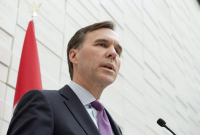A U.K.-based economist known for advocating a prominent role for the state in fostering modern, high-tech growth is expected to leave her mark on Wednesday's federal budget.
Mariana Mazzucato's 2013 book, "The Entrepreneurial State: Debunking Public vs. Private Sector Myths," is required reading in the office of Navdeep Bains, and offers a glimpse at some of the ideas behind Ottawa's so-called innovation strategy.
On Wednesday, the Trudeau government's second budget will provide additional details of its plan to foster an innovation economy across all industries as a means of recharging Canada's long-term economic growth.
Bains, who as economic development minister has been overseeing Canada's innovation agenda, has had discussions with Mazzucato. Her concepts have significantly influenced both him and his policy team, insiders say.
Mazzucato, an economics professor at University College London, seeks to dispel the belief that innovation only happens in a free-market setting, with the public sector staying well out of the way.
She says risk-wary private-sector investors are often ill at ease with unfamiliar new technology, and points to success stories like Apple's iPhone as evidence of what can happen when governments make bold, early investments.
Indeed, when it comes to Mazzucato's book, Bains's office has paid particular attention to Chapter 5: "The State Behind the iPhone."
In it, she writes that U.S. government support was at the root of many of the technologies found in Apple's popular iPod, iPhone and iPad devices.
The early development behind what eventually became known as Apple's virtual personal assistant, Siri, was a direct result of support from government investment and research, she argues.
Enabling companies to take risks with emerging technologies is "much easier in a country in which the state plays the pivotal serious role of taking on the development of high-risk investments" until the private sector gets involved, Mazzucato writes.
"Thus, while 'free market' pundits continue to warn of the danger of government 'picking winners,' it can be said that various U.S. government policies laid the foundation that provided Apple with the tools to become a major industry player in one of the most dynamic high-tech industries of the 21st century so far."
Those who argue against "picking winners" often overlook an important fact, Mazzucato adds: States that are seen to "fail" are usually aiming at a goal far more difficult than those attempted by private firms — launching a new technology like the Internet, for instance.
"While the role of the private sector has typically been hyped up," she writes, "the public sector's role has been hyped down."
When it comes to industrial policy, some of Ottawa's most influential economic advisers have recommended it take more of a hands-on approach in order to boost growth.
Last month, Finance Minister Bill Morneau's economic advisory council called on the government to identify between six and eight key sectors "where Canada has a strong endowment, untapped potential, and significant global growth prospects."
From there, the report suggested Ottawa focus on carefully designed policy actions, such as deregulation and boosting skilled labour, for each industry to make the most of their opportunities.
The report listed several industries: agriculture and food, energy and renewables, mining and metals, health care and life sciences, advanced manufacturing, financial services, tourism and education.
It remains to seen if the government will specifically target policies and funding to what it considers as key sectors.
The council, chaired by Dominic Barton, managing director of global consulting giant McKinsey & Co., has helped guide the Trudeau government's policy direction in the past.
The advisers also recommended Ottawa take on a bigger role by assembling "innovation marketplaces" that unite entrepreneurs and researchers with public and private customers. They said the marketplaces should be centres of technology and industrial activity that are driven by the private sector.
The Liberal government is expected to hold a competition when it follows through on its $800-million commitment in last year's budget to support "innovation networks and clusters."
The plan is part of Ottawa's central goal to help budding firms scale up into global players. The funding will support researchers, post-secondary institutions and companies that can persuade Ottawa they're best positioned to help young, high-potential firms prosper.






Comments